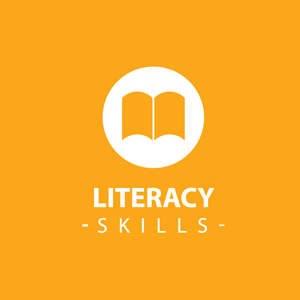You are viewing this content as a guest. You can see what titles we offer for this category, but you will not be able to view these titles.

Literacy Skills Programs
This series is perfect for beginning readers with the desire to further develop their literary skills. There are six core vocabulary programs, in addition to three noun programs and three verb programs, gradually progressing in difficulty with each program in the series. There is also one program covering basic adjectives and adverbs, Describing Words.
Here are the courses that are available in the Literacy Skills category.
Core Vocabulary 1
Core Vocabulary 1 includes 88 describing words. Describing words are words that tell about or describe something. Core Vocabulary 1 includes such words as best, different, important, mine, pretty and true.
Core Vocabulary 2
Core Vocabulary 2 includes where, linking words, who and when or how words. Where tells you at what place; Linking Words join two sentences together; Who contains words that tell about the person; and When or How contains words that tell what time or how something will happen.
Core Vocabulary 3
Core Vocabulary 3 includes nouns. Nouns are naming words. They name people, places and things. Core Vocabulary 3 includes such words as class, home, music, party, story and water.
Core Vocabulary 4
Core Vocabulary 4 includes conversation words. Conversation Words are words or phrases that are often used when talking to other people; Numbers are how many; Colors tell what color something is; and Time words tell when something will happen. Core Vocabulary 4 includes such words as Conversation Words: goodbye, please, sorry; Numbers; Colors; and Time: week, tomorrow, and hour.
Core Vocabulary 5
Core Vocabulary 5 includes what words. What words tell what someone is doing. Core Vocabulary 5 includes such words as buy, count, finish, get, join and laugh.
Core Vocabulary 6
Core Vocabulary 6 includes what words. What words tell what someone is doing. Core Vocabulary 6 includes such words as open, relax, stop, try, watch and write.
Describing Words
Language is much more interesting when creative adjectives and adverbs are used to describe people, places, and things. Individuals can use this program in conjunction with our Nouns and Verbs programs help create simple sentences. Examples of words found in this program include ahead, behind, clean, closed, empty, hot, large, open, smooth, and tall.
Nouns 1
The first Nouns program helps users build a solid vocabulary base, covering 80 common nouns encountered in everyday life. Examples of nouns addressed in this program include baby, bed, dog, eyes, girl, milk, and more.
Nouns 2
Nouns 2 builds on the vocabulary words learned in the first Nouns program. Nouns 2 continues to focus on words we use every day, but introduces users to slightly more advanced nouns.
Nouns 3
As the most advanced program in the Nouns Series, Nouns 3 helps to build user’s fundamental literacy skills. This 80 word program will better equip users to take on more challenging reading tasks.
Verbs 1
Even the most simple sentence requires an action word. The first Verbs program teaches users how to build simple sentences when used in tandem with our Nouns Series. A few of the 80 verbs covered include words such as ask, close, cry, hold, jump, and laugh.
Verbs 2
The second Verbs program expands upon the first program with 80 slightly more advanced common verbs useful for everyday conversation.
Verbs 3
Verbs 3 helps users expand upon the basic literacy skills, providing them with more complex verbs to use.
